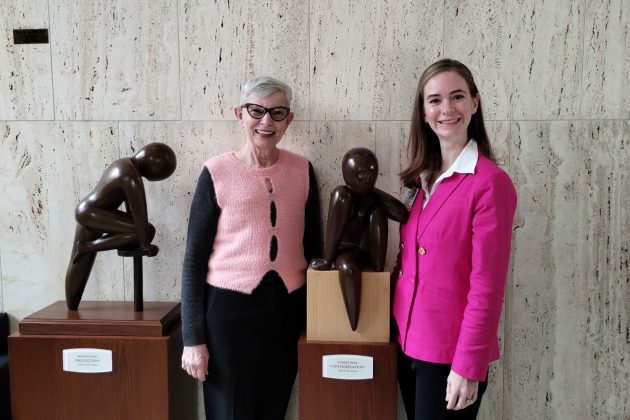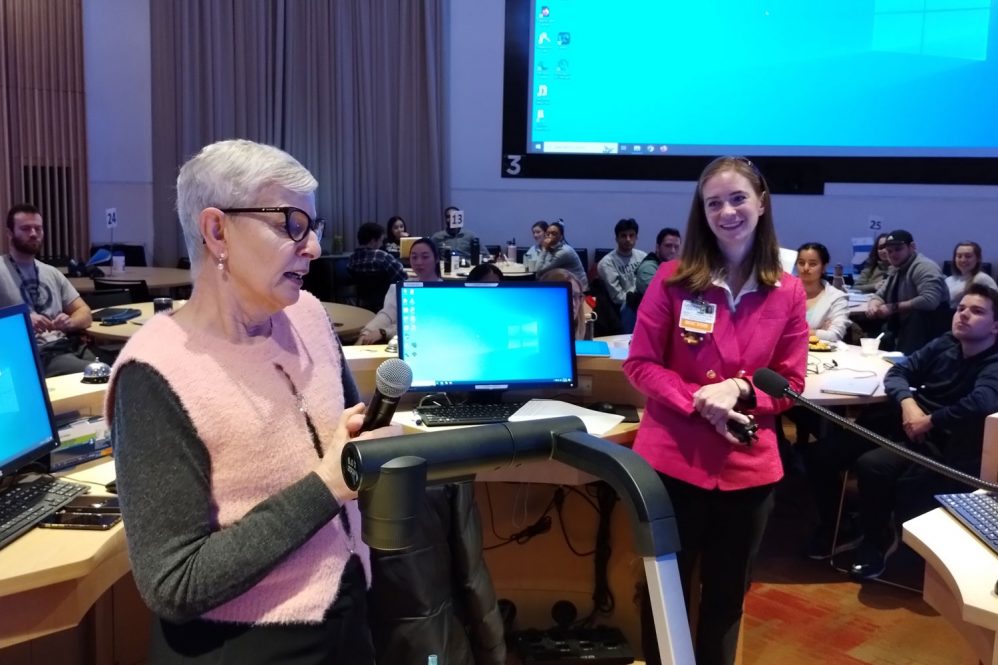Whether they go into geriatrics or another specialty, many of Dr. Jaclyn Jaeger’s students likely will, to varying degrees, provide care to older adults.
And when they do, they’ll have some pearls of wisdom to take with them.
Jaeger, an assistant professor in the UConn School of Medicine and geriatrician in the UConn Center on Aging, closed her second-year geriatrics curriculum by introducing “one of the healthiest, best examples of successful aging of all my patients.”
Then, Marguerite Rose came forward, stood with Jaeger in the center of the academic rotunda, and explained how the term “senior” can be misleading.
“We have a number in our head that is our age, that’s not what our age is, and my ‘head age’ is 32,” Rose told the students. “I’ll be 72 next month, and to me that isn’t quite senior. I think 80s is when you can call yourself senior, and 90s is… older.”
Rose, of West Hartford, shared how she was recruited to run in the Boston Marathon to raise money for Boston Children’s Hospital. She started training but stopped when she started experiencing lower back discomfort.

“I decided, because I want to live long and keep running, that I’m going to let this back rest for this season,” Rose says. “Whether I’ll do marathons again, I don’t know, but 13 miles, half marathon, is definitely in my dreams.”
She says she took up distance running in her 30s and has stuck with it since.
“There are so many people in my world that are runners in their 80s, and it’s just pretty amazing, but they’ve been doing it for a very long time; and you still can, but you have to realize, sometimes the body will take over,” Rose says. “I can usually do pretty well in my age division now, but every now and then there’s someone a couple years older than me that stalks me, and I’m like, ‘Where’d she come from? It was my race!’”
Today, 30 years after her first full marathon, Rose says running keeps her active, healthy and happy, and she plans to “carry on until my body changes my mind.”
Jaeger asked her what advice she’d give to the future physicians before her about approaching the care of an older person.
“It’s so important to have a good doctor that supports you, that, for me, I like to visit and I feel comfortable and I’m not hesitant to contact the office with a question,” Rose says. “You’ve got to respect them and make them feel very important upon first meeting you so that they will tell you the whole story. There are probably patients that don’t tell you everything because they’re uncomfortable, but if you reach a different level with them, they’ll respond better to all treatments.”
The students in the audience soon will enter the phase of their training that includes opportunities to interact with patients, geriatric and others, in hospital and office settings.
“This week in the curriculum is an elegant representation of the clinical complexity that students will encounter throughout their clerkships and careers,” Jaeger says. “It also showcases the heterogeneity of the aging process and emphasizes successful, healthy aging concepts. What a way to end the pre-clinical years!”



